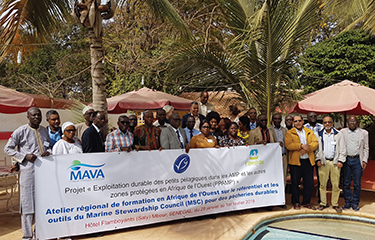Multiple fisheries in West Africa are currently implementing two key projects that could, in the short-term, reverse declining seafood resources to pave the way for building up stocks, improving fishery management measures, reducing bycatch, and achieving effective control and monitoring of the region’s fishing activities.
The two projects, which also focus on empowering fishers and other seafood value chain operators through training and financial support, are dubbed the “Sustainable exploitation of small pelagic in marine protected areas and other protected areas in West Africa (PPAMP),” a project coordinated by RAMPAO, and "Leading West African fisheries toward sustainable fishing practices” (LEAD), with support from MAVA Foundation and financial solutions specialist Clarmondial.
According to the Marine Stewardship Council, which is providing some of the quality tools and models for use in both projects, the PPAMP project focuses on building “capacity for improved fisheries management, particularly to reduce overexploitation of small pelagic fisheries interacting with MPAs across Mauritania, Senegal, The Gambia, and Guinea-Bissau.”
MSC is supporting the project by providing its environmental standard standard as a key tool in its implementation.
The LEAD project is focused on the identification of the technical and financial obstacles that have made it difficult for fisheries in Northwest Africa to improve management practices.
The project covers eight fisheries located in Cape Verde, Mauritania, Senegal, and The Gambia, ranging from larger commercially important to artisanal fleets.
“Both projects use the MSC fisheries standard as a reference to drive improvements in the management and governance of West African fisheries,” the MSC said.
MSC Senior Fisheries Program Manager for Pathways and Small Pelagics Carlos Montero Castaño said the MSC standard “is a very strong tool used by both the LEAD and PPAMP projects to identify the environmental challenges of the fisheries, and to plan improvements to overcome their sustainability barriers.”
Should the two projects achieve the desired and measureable environmental benefits, fisheries in West Africa could easily increase efficiency with possibility of generating an additional USD 300 million (EUR 254 million) in direct earnings annually from commercial fish production, according to the World Bank. The additional revenues would come from the envisaged “improved governance and management of fisheries and marine ecosystems, as well as greater local investment.”
Currently, MSC said, fisheries in West Africa are grappling with rising production that has led to maximum exploitation levels being met or exceeded for most commercially important fish stocks in the region.
The region also continues to report rampant illegal, unreported, and unregulated (IUU) fishing, with the MSC estimating the lost fish harvest at one-third of the total output from the West African fisheries. Nevertheless, MSC said a total of 12 fisheries under the two projects “have each undergone MSC pre-assessments to identify where they need to make improvements.”
Last June, a U.K.-based consulting firm specializing in promoting sustainable utilization of aquatic and fisheries resources, MRAG Ltd, was picked to spearhead formulating action plans for the 12 pre-assessed fisheries and developing individual fishery “to-do lists” for optimized ecological performance and fisheries management, the MSC said.
“For LEAD, the action plans also help inform the design of dedicated financing mechanisms to support West African fisheries’ transition to sustainable management practices,” MSC said.
The project is financed by the MAVA Foundation, including capacity-building training at the MSC “Level 1” and “Level 2” for at least 165 experts drawn from universities, research institutions, and fisheries administration. With the June enlisting of MRAG Ltd., there will be opportunity for additional training for local experts at MSC’s “Level 3” as the MSC works to create a pool of experts to support the region’s seafood industry through assessing and advising fisheries and agencies in charge of coastal management.
“The MSC expects the impact of these regional projects will contribute to the local delivery of the United Nations' Sustainable Development Goal 14, 'Life Below Water,'” the MSC said.
Photo courtesy of the Marine Stewardship Council







